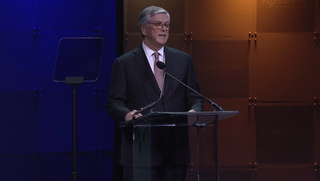NAB Show: D.C. Should Insure Big Tech Can't Stifle Local News, Says Smith

National Association of Broadcasters president Gordon Smith put out the welcome mat for "content creators, producers, distributors and technology companies from all corners of the globe," suggesting they were all part of a next generation of storytellers — ”everybody has a story to tell,” he said. But he also signaled that Big Tech might not be on the same page.
Smith was weighing in on the state of the industry at the opening session of the NAB Show in Las Vegas Monday (April 8).
The former Republican U.S. senator from Oregon said he does not often agree with Sen. Elizabeth Warren (D-Mass.), but he was intrigued by her comments that Big Tech has ”bulldozed competition, used our private information for profit and tilted the playing field against everyone else. And in the process, they have hurt small businesses and stifled innovation.”
He wondered whether that was one of the reasons why manufacturers have been reluctant to put TV receiver chips in their phones. ”Manufacturers, Apple being one, refuse to enable broadcast chips in their devices,“ he said.
Added Smith: “Given the threat to local journalism that is posed by these tech companies, lawmakers can enable broadcasters to better compete and to support journalism in this new landscape in two ways:
”First, modernize outdated broadcast regulations to allow us to compete on a level playing field with these behemoth tech and pay-TV companies to better ensure that broadcast journalism can flourish.
”And second, increase regulation on these behemoth tech companies to ensure that these companies cannot use their market power to stifle competition and the financial viability of local news.“
Broadcasting & Cable Newsletter
The smarter way to stay on top of broadcasting and cable industry. Sign up below
Smith's speech came against a backdrop of bipartisan pushes for regulating Big Tech, the rollout of the ATSC 3.0 advanced TV transmission standard — the FCC is close to wrapping up the framework for that rollout, including addressing some reconsideration petitions from cable operators — and amidst criticisms from President Donald Trump that news he doesn't like or agree with is fake.
The FCC is also contemplating providing more flexibility in how broadcasters provide informational and informational children's programming and whether and how to adjust the current 39% cap on a TV station groups national audience reach, so NAB has a lot of irons in the fire inside the Beltway.
Smith took a moment (followed by a moment of silence) at the outset to remember the late Bruce Reese, former head of Hubbard Radio and Bonneville International, who died last week. He said Reese had been "passionate about this great industry and telling its story of public service. He was an everyday hero and will be greatly missed."
Smith also talked of broadcasters as everyday heroes, the first informers who, through local news and emergency information, show a "deep-rooted commitment that manifests itself in many ways that often go unnoticed — in ways that have become ingrained in everyday life for millions of Americans."
That commitment did not go unnoticed in Washington last week, where FCC commissioner Jessica Rosenworcel went out of her way to tell a House hearing panel that broadcasting is critical infrastructure.
"Make no mistake, what you do is vital — you are indispensable and irreplaceable," Smith said.
He suggested that was nowhere more evident than in local news.
“In the past, communities could also rely on their local newspapers…but the industry has been undermined by the rise of the internet and social media companies,” Smith said. ”Now some of these companies and our competitors are complaining that there’s not enough local news to feed their own news streams. This irony is not lost on me. Yet, I doubt that they will ever be able to replicate the local content that broadcasters provide to our communities. They will never have local broadcasters’ commitment to the investigative journalism that exposes government corruption and other abuses of power. And, they will never have what broadcasters have that make us so different from our competitors — our connection to local communities.”
Smith said NAB is making sure Washington understands all that.
One of broadcasting's most exciting stories, he said, was next generation television (ATSC 3.0), including 4K video, immersive sound, interactive applications, targeted advertising and mobility.
Smith said NAB will continue the fight in Washington for flexibility in that rollout,
Another priority will be opposing reauthorization of STELAR, the satellite compulsory license that Smith said “prevents many viewers from receiving their local TV channels,” as well as “fighting pay-TV companies’ attempts to dismantle the retransmission consent process … and ensuring fair streaming rates that make simulcasting viable for local stations.”
Contributing editor John Eggerton has been an editor and/or writer on media regulation, legislation and policy for over four decades, including covering the FCC, FTC, Congress, the major media trade associations, and the federal courts. In addition to Multichannel News and Broadcasting + Cable, his work has appeared in Radio World, TV Technology, TV Fax, This Week in Consumer Electronics, Variety and the Encyclopedia Britannica.

